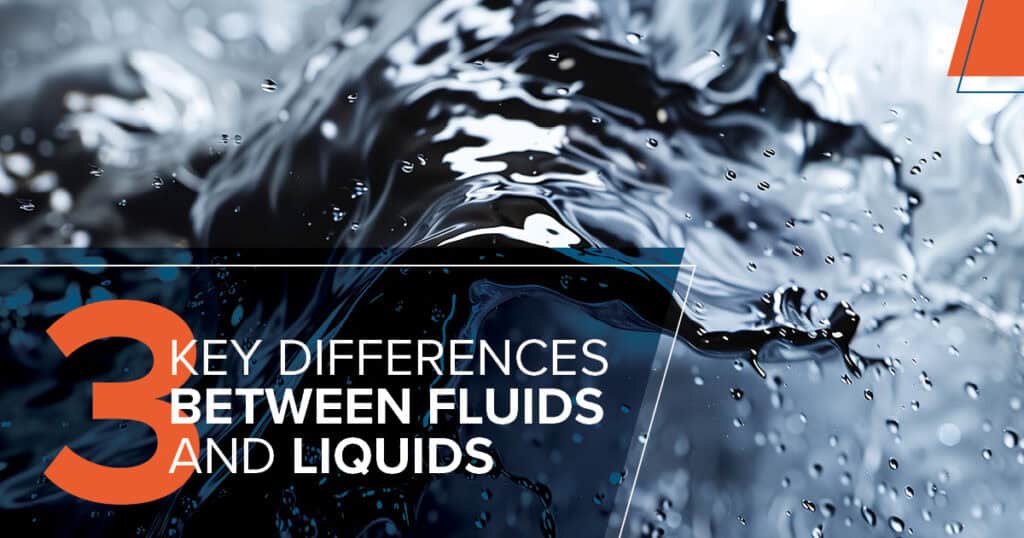When it comes to pumps, understanding the differences between fluids and liquids is crucial for optimizing performance and efficiency. These terms are often used interchangeably. However, they have very distinct meanings in an engineering context. Specifically, the characteristics of viscosity, density, and vapor pressure are critical to determine how a substance behaves as it flows through a pump system. It can directly affect key issues like flow rates, energy consumption, and system design.
1. Viscosity
Viscosity is a measure of a fluid’s resistance to flow. The term “fluids” actually includes both liquids and gases, which can have a range of viscosities. Viscosity plays a significant role in determining how easily a fluid can be moved through a pump system. For example, gases generally have low viscosity and are easy to pump with minimal energy. Meanwhile, liquids can vary significantly in viscosity. Water is a very low-viscosity liquid, which is why it flows easily through most pump systems. Thicker liquids like oil or syrup require more energy to move because of their higher viscosity.
The viscosity of a process liquid directly impacts the choice of pump. High-viscosity liquids typically require positive displacement (PD) pumps, which can handle thicker substances without losing efficiency. Conversely, centrifugal pumps are often used for low-viscosity liquids. They can maintain high flow rates with minimal resistance. Understanding the viscosity of the fluid being pumped is essential for selecting the right pump and ensuring efficient operation.
2. Density
Density refers to the mass per unit volume of a substance. It is another crucial factor in pump system design. Fluids vary in density, with gases being much less dense than liquids. The density of a fluid affects how much energy is required to move it through a system. Higher-density fluids require more energy to pump, which can influence the choice of pump and the overall energy consumption of the system.
In the context of liquids, density is relatively constant for a given substance under standard conditions. Yet it can vary with differences in temperature and pressure. For example, water has a higher density than oil. Pumping water requires more power than pumping oil, if all other factors are equal. It’s crucial to account for the density of the liquid being pumped. It affects the system’s pressure requirements, as well as the size of pump needed to achieve the desired flow rate.
3. Vapor Pressure
Vapor pressure is the pressure at which a liquid begins to vaporize into a gas at a specific temperature. This characteristic is critical in pump systems because it directly impacts the risk of cavitation, a phenomenon where vapor bubbles form in the liquid being pumped. Cavitation can potentially cause major damage to the pump and reduce efficiency.
Fluids with high vapor pressures, such as certain volatile liquids, are more prone to cavitation. Cavitation is even more of a risk when volatile fluids reach higher temperatures. If the pressure in the pump drops below the liquid’s vapor pressure, cavitation can occur. This is particularly problematic in centrifugal pumps because rapid pressure changes are common. To mitigate cavitation, engineers must carefully consider the vapor pressure of the liquid being pumped and ensure the system is designed to maintain pressures above this threshold.
Liquids with lower vapor pressures are less likely to cause cavitation, making them easier to handle in pump systems. Selecting a pump that can maintain appropriate pressure levels is key to preventing cavitation and ensuring long-term system reliability.
Pump Selection Factors
The distinctions between fluids and liquids are more than academic—they have real-world implications for system performance and efficiency in pump systems. Understanding these differences in viscosity, density, and vapor pressure is essential for selecting the best pump. It can also enable you to design more efficient systems and avoid potential issues like cavitation.
For assistance with your pump selection needs based on your fluid characteristics, performance requirements, and budget, contact the team at DXP Pacific. Let our pump engineering experts guide you toward the best equipment and system design solutions for your specific application.

